Adult Nursing and Interprofessional Collaborative Practice Report
VerifiedAdded on 2023/01/04
|15
|1812
|86
Report
AI Summary
This report provides an introduction to interprofessional education (IPE) within the context of nursing practice. It begins by defining IPE as professionals in health and social care learning together to enhance collaborative practice, ultimately improving patient outcomes. The report identifies and explains the benefits of IPE, such as enhanced teamwork skills and improved patient care, while also addressing challenges like lack of communication and trust among professionals. The author, an adult nursing student, describes how their professional role supports IPE through collaboration with various healthcare professionals, including doctors, social workers, and family members. The report then reflects on the essential skills required for collaborative learning, including communication, teamwork, decision-making, and problem-solving, and explains how these skills are applied in practice, particularly within a nursing context. The report concludes by highlighting the importance of IPE in creating a successful healthcare environment and providing high-quality patient care, referencing various studies to support the discussed concepts.
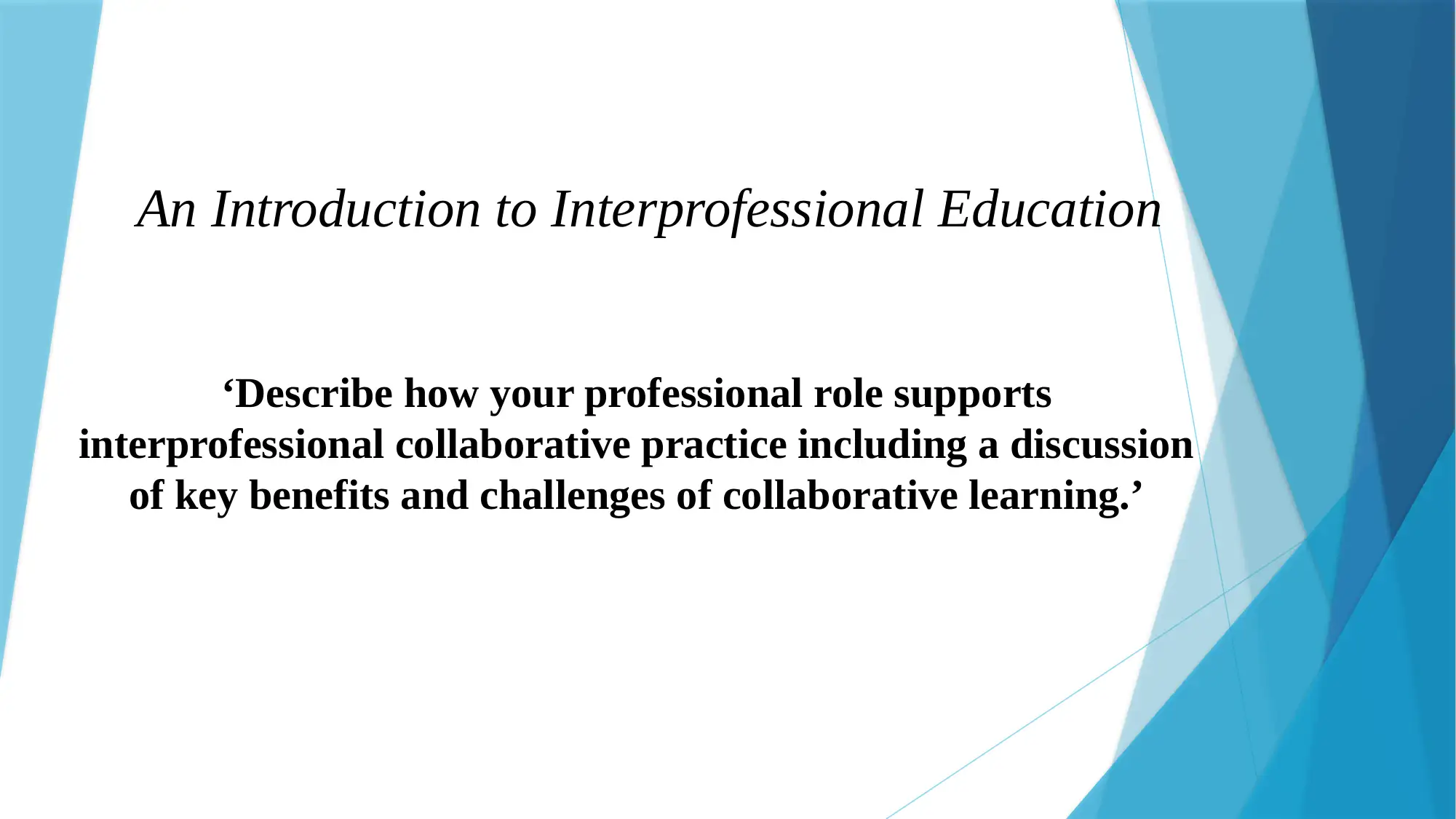
‘Describe how your professional role supports
interprofessional collaborative practice including a discussion
of key benefits and challenges of collaborative learning.’
An Introduction to Interprofessional Education
interprofessional collaborative practice including a discussion
of key benefits and challenges of collaborative learning.’
An Introduction to Interprofessional Education
Paraphrase This Document
Need a fresh take? Get an instant paraphrase of this document with our AI Paraphraser
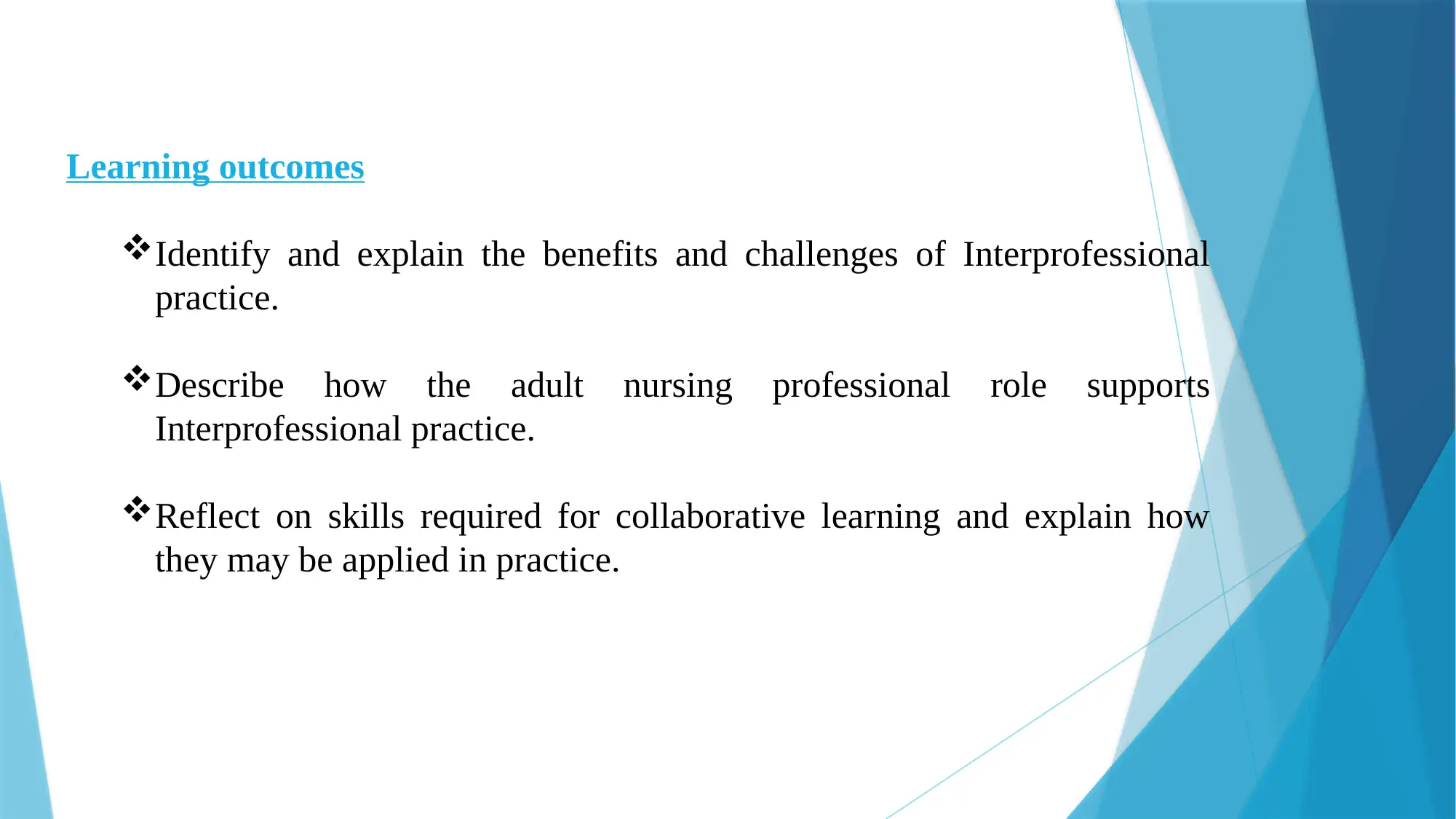
Learning outcomes
Identify and explain the benefits and challenges of Interprofessional
practice.
Describe how the adult nursing professional role supports
Interprofessional practice.
Reflect on skills required for collaborative learning and explain how
they may be applied in practice.
Identify and explain the benefits and challenges of Interprofessional
practice.
Describe how the adult nursing professional role supports
Interprofessional practice.
Reflect on skills required for collaborative learning and explain how
they may be applied in practice.
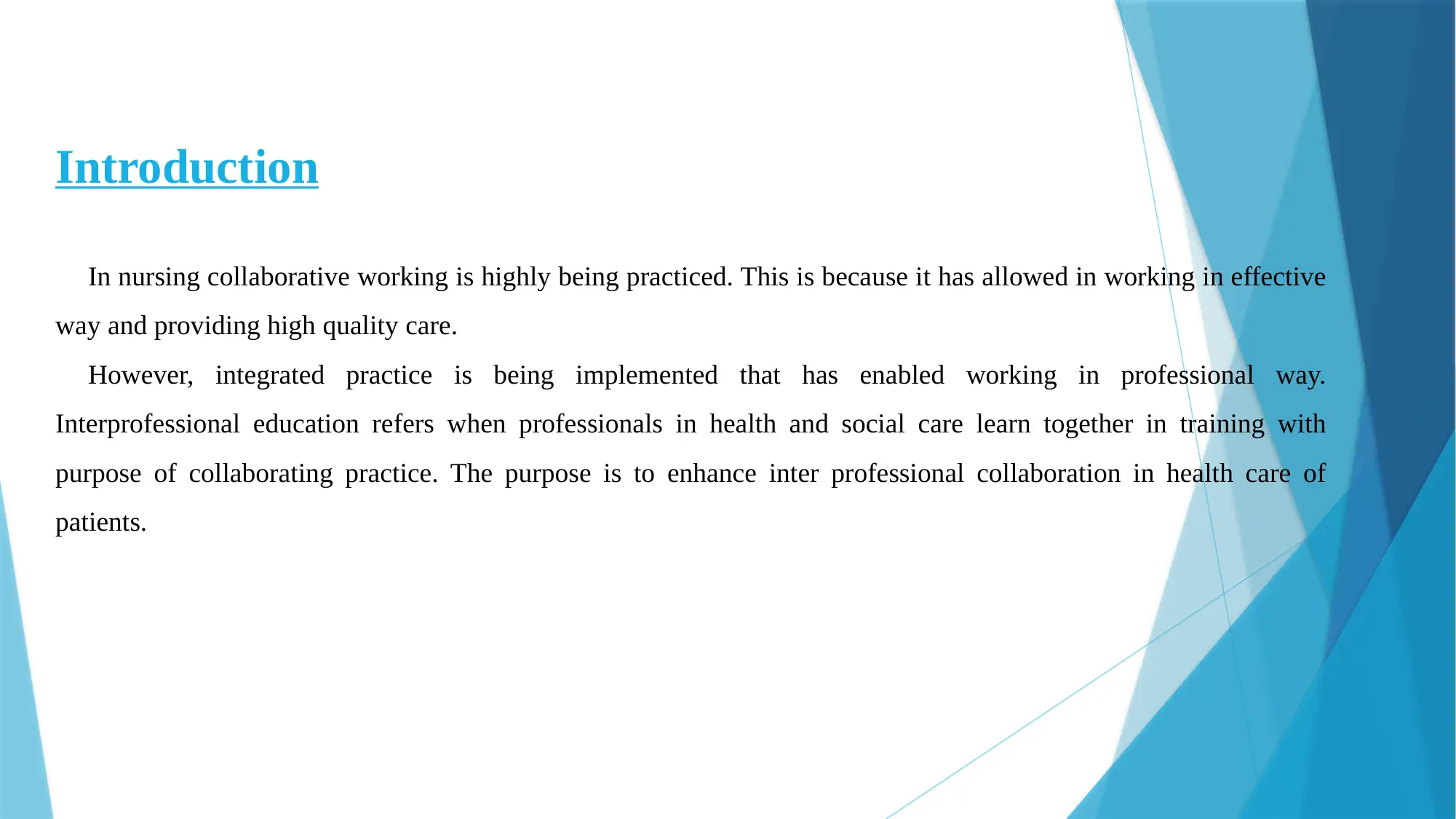
Introduction
In nursing collaborative working is highly being practiced. This is because it has allowed in working in effective
way and providing high quality care.
However, integrated practice is being implemented that has enabled working in professional way.
Interprofessional education refers when professionals in health and social care learn together in training with
purpose of collaborating practice. The purpose is to enhance inter professional collaboration in health care of
patients.
In nursing collaborative working is highly being practiced. This is because it has allowed in working in effective
way and providing high quality care.
However, integrated practice is being implemented that has enabled working in professional way.
Interprofessional education refers when professionals in health and social care learn together in training with
purpose of collaborating practice. The purpose is to enhance inter professional collaboration in health care of
patients.
⊘ This is a preview!⊘
Do you want full access?
Subscribe today to unlock all pages.

Trusted by 1+ million students worldwide
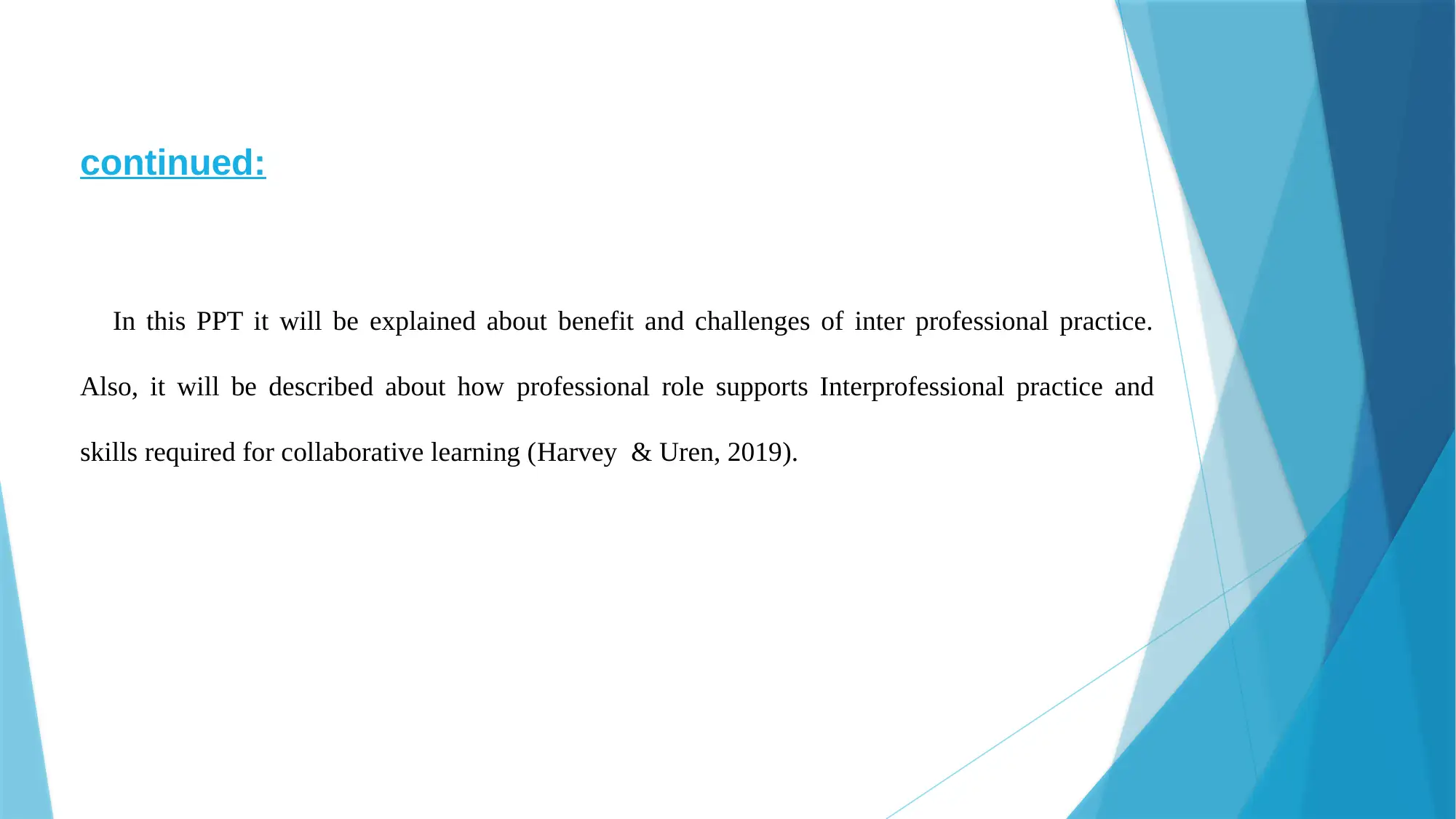
continued:
In this PPT it will be explained about benefit and challenges of inter professional practice.
Also, it will be described about how professional role supports Interprofessional practice and
skills required for collaborative learning (Harvey & Uren, 2019).
In this PPT it will be explained about benefit and challenges of inter professional practice.
Also, it will be described about how professional role supports Interprofessional practice and
skills required for collaborative learning (Harvey & Uren, 2019).
Paraphrase This Document
Need a fresh take? Get an instant paraphrase of this document with our AI Paraphraser
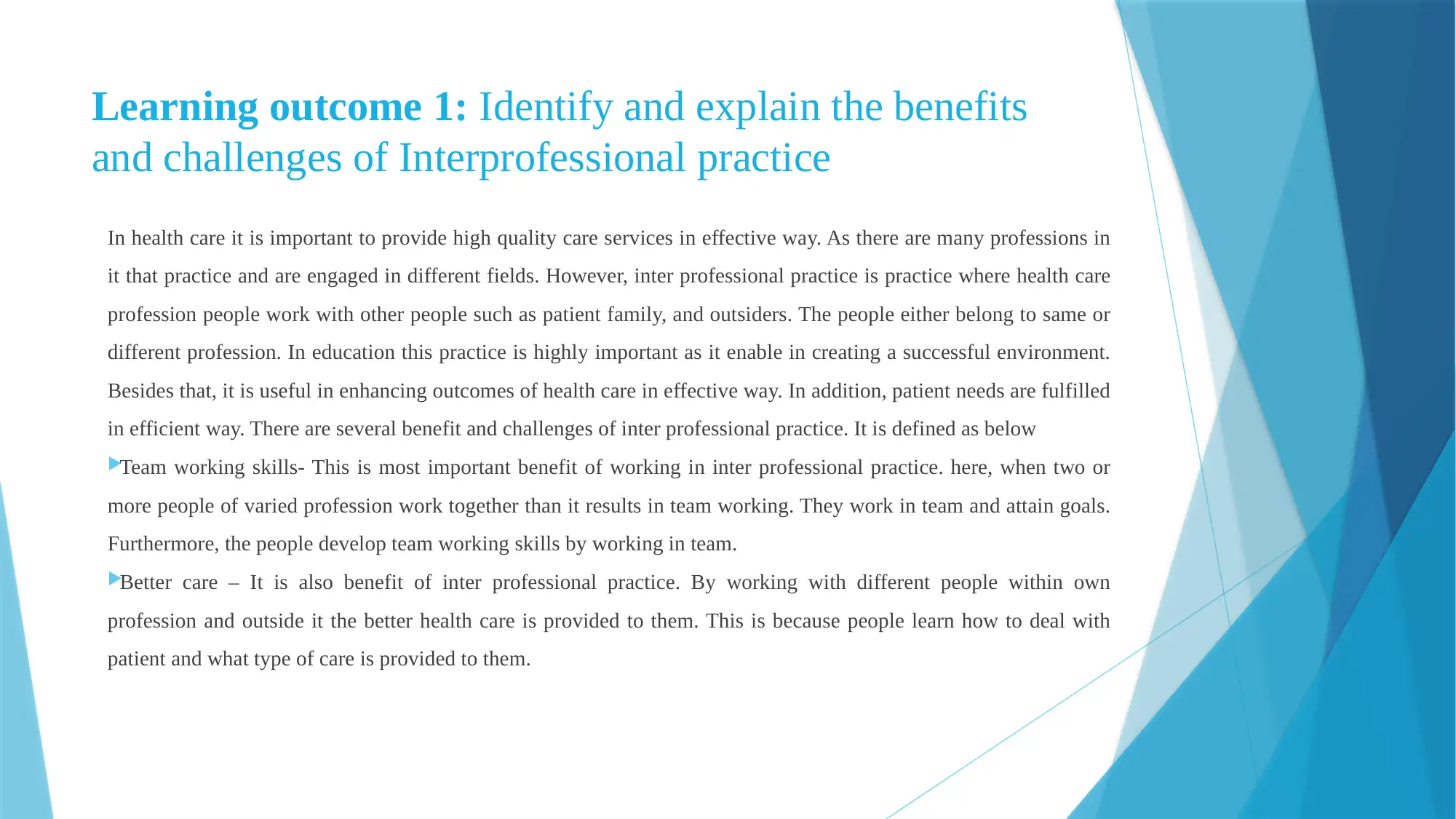
Learning outcome 1: Identify and explain the benefits
and challenges of Interprofessional practice
In health care it is important to provide high quality care services in effective way. As there are many professions in
it that practice and are engaged in different fields. However, inter professional practice is practice where health care
profession people work with other people such as patient family, and outsiders. The people either belong to same or
different profession. In education this practice is highly important as it enable in creating a successful environment.
Besides that, it is useful in enhancing outcomes of health care in effective way. In addition, patient needs are fulfilled
in efficient way. There are several benefit and challenges of inter professional practice. It is defined as below
Team working skills- This is most important benefit of working in inter professional practice. here, when two or
more people of varied profession work together than it results in team working. They work in team and attain goals.
Furthermore, the people develop team working skills by working in team.
Better care – It is also benefit of inter professional practice. By working with different people within own
profession and outside it the better health care is provided to them. This is because people learn how to deal with
patient and what type of care is provided to them.
and challenges of Interprofessional practice
In health care it is important to provide high quality care services in effective way. As there are many professions in
it that practice and are engaged in different fields. However, inter professional practice is practice where health care
profession people work with other people such as patient family, and outsiders. The people either belong to same or
different profession. In education this practice is highly important as it enable in creating a successful environment.
Besides that, it is useful in enhancing outcomes of health care in effective way. In addition, patient needs are fulfilled
in efficient way. There are several benefit and challenges of inter professional practice. It is defined as below
Team working skills- This is most important benefit of working in inter professional practice. here, when two or
more people of varied profession work together than it results in team working. They work in team and attain goals.
Furthermore, the people develop team working skills by working in team.
Better care – It is also benefit of inter professional practice. By working with different people within own
profession and outside it the better health care is provided to them. This is because people learn how to deal with
patient and what type of care is provided to them.

Challenges of interprofessional practice
Apart from benefits there are certain challenges as well which occurs in interprofessional practice.
It is as follows
Lack of communication- It is major challenge in it as varied types of health care profession work together
so they may not be able to speak properly. Also, people may not be able to understand each other and this
leads to lack of communication. Here, language and diversity is also problem in it as they might not feel
comfortable in interacting and practice their own profession.
Lack of trust – This is also a challenge as by working in collaborative practice people may not trust each
other way of working. Furthermore, all people are new and hesitate to work with each other. Apart from it, as
people belong to different profession so they prefer to practice their profession only. It is due to lack of
confidence that they do not work with others. Hence, no bond is shared between them. Thus, this led to lack
of trust among them.
Apart from benefits there are certain challenges as well which occurs in interprofessional practice.
It is as follows
Lack of communication- It is major challenge in it as varied types of health care profession work together
so they may not be able to speak properly. Also, people may not be able to understand each other and this
leads to lack of communication. Here, language and diversity is also problem in it as they might not feel
comfortable in interacting and practice their own profession.
Lack of trust – This is also a challenge as by working in collaborative practice people may not trust each
other way of working. Furthermore, all people are new and hesitate to work with each other. Apart from it, as
people belong to different profession so they prefer to practice their profession only. It is due to lack of
confidence that they do not work with others. Hence, no bond is shared between them. Thus, this led to lack
of trust among them.
⊘ This is a preview!⊘
Do you want full access?
Subscribe today to unlock all pages.

Trusted by 1+ million students worldwide

Learning outcome 2: Describe how your professional role
supports Interprofessional practice
• I analysed that interprofessional practice refers when professionals in health and social care learn
together in training with purpose of collaborating practice. The purpose is to enhance inter
professional collaboration in health care of patients. I found that my professional role was of adult
nurse. Here, by working as student interprofessional practice is done. Similarly, my role also
supported this practice. The reason is that here I found that adult nurse work with many people in
health care sector (Leedahl, Sellon, & Gallopyn, 2017). I have to deliver care services to patients.
Besides that, I need to interact with doctors, family members, social worker, etc. Thus, these all are
people with whom I worked. In addition, I need to determine patient needs and accordingly
provide care to them.
supports Interprofessional practice
• I analysed that interprofessional practice refers when professionals in health and social care learn
together in training with purpose of collaborating practice. The purpose is to enhance inter
professional collaboration in health care of patients. I found that my professional role was of adult
nurse. Here, by working as student interprofessional practice is done. Similarly, my role also
supported this practice. The reason is that here I found that adult nurse work with many people in
health care sector (Leedahl, Sellon, & Gallopyn, 2017). I have to deliver care services to patients.
Besides that, I need to interact with doctors, family members, social worker, etc. Thus, these all are
people with whom I worked. In addition, I need to determine patient needs and accordingly
provide care to them.
Paraphrase This Document
Need a fresh take? Get an instant paraphrase of this document with our AI Paraphraser
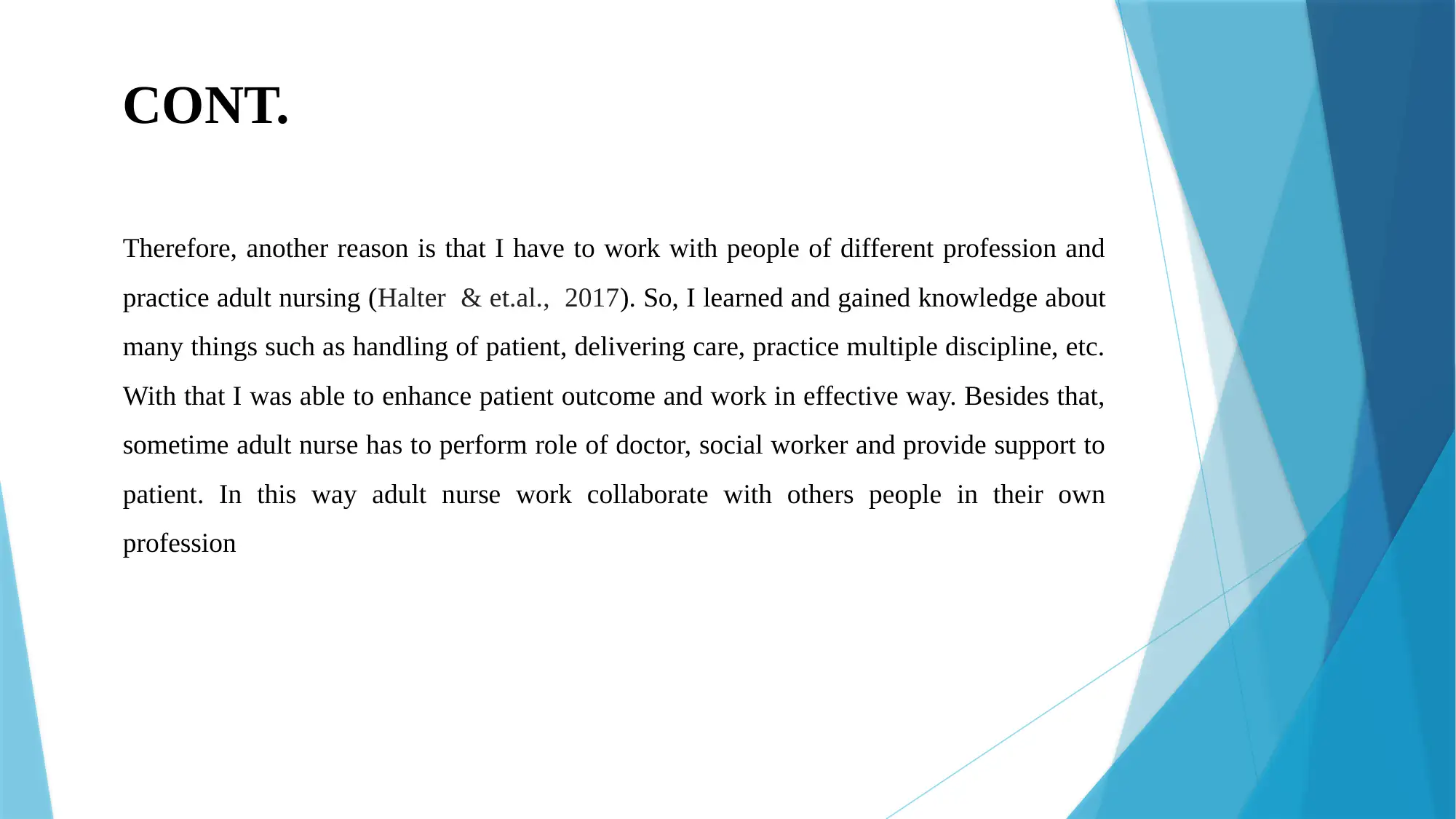
Therefore, another reason is that I have to work with people of different profession and
practice adult nursing (Halter & et.al., 2017). So, I learned and gained knowledge about
many things such as handling of patient, delivering care, practice multiple discipline, etc.
With that I was able to enhance patient outcome and work in effective way. Besides that,
sometime adult nurse has to perform role of doctor, social worker and provide support to
patient. In this way adult nurse work collaborate with others people in their own
profession
CONT.
practice adult nursing (Halter & et.al., 2017). So, I learned and gained knowledge about
many things such as handling of patient, delivering care, practice multiple discipline, etc.
With that I was able to enhance patient outcome and work in effective way. Besides that,
sometime adult nurse has to perform role of doctor, social worker and provide support to
patient. In this way adult nurse work collaborate with others people in their own
profession
CONT.
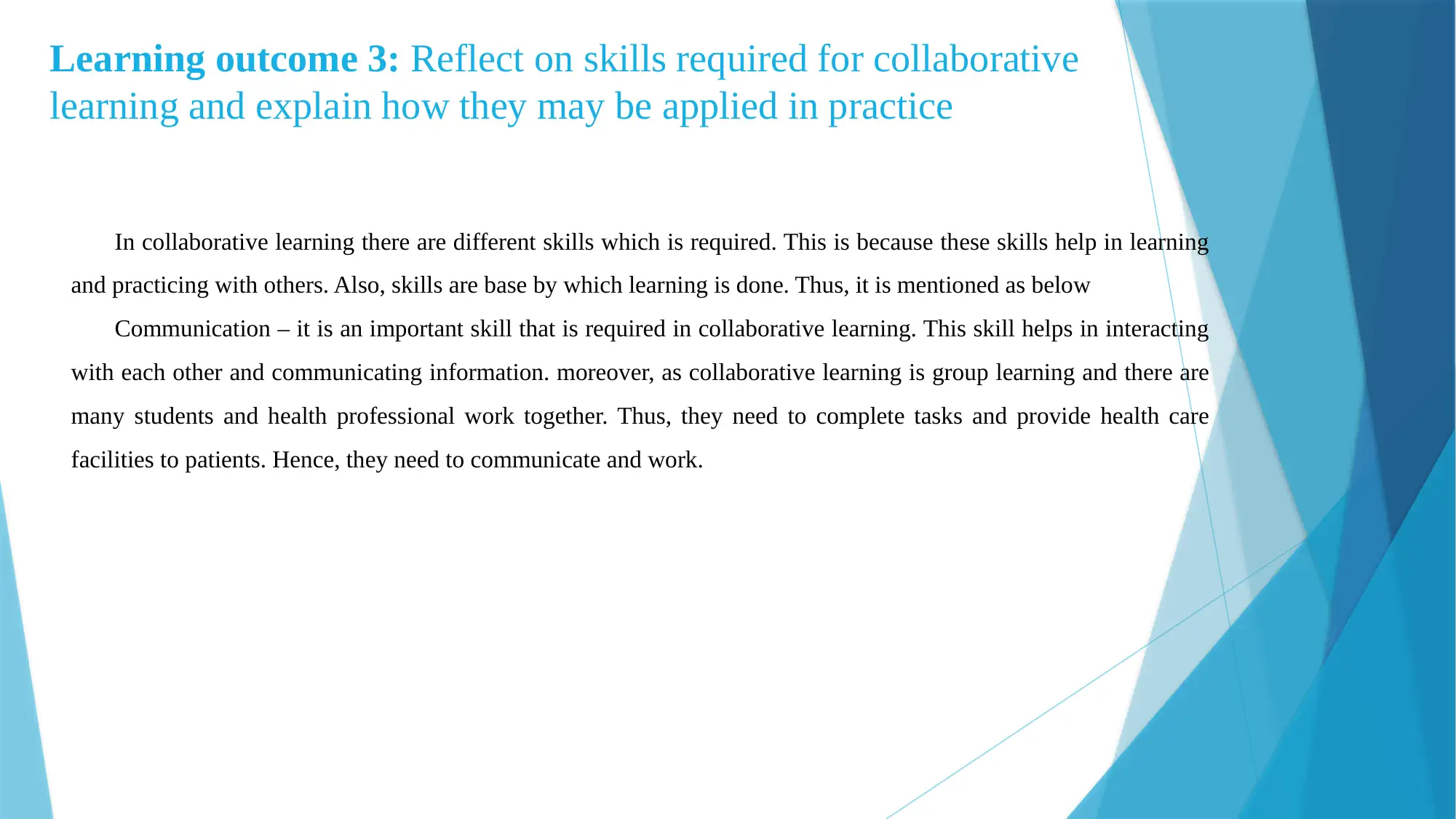
Learning outcome 3: Reflect on skills required for collaborative
learning and explain how they may be applied in practice
In collaborative learning there are different skills which is required. This is because these skills help in learning
and practicing with others. Also, skills are base by which learning is done. Thus, it is mentioned as below
Communication – it is an important skill that is required in collaborative learning. This skill helps in interacting
with each other and communicating information. moreover, as collaborative learning is group learning and there are
many students and health professional work together. Thus, they need to complete tasks and provide health care
facilities to patients. Hence, they need to communicate and work.
learning and explain how they may be applied in practice
In collaborative learning there are different skills which is required. This is because these skills help in learning
and practicing with others. Also, skills are base by which learning is done. Thus, it is mentioned as below
Communication – it is an important skill that is required in collaborative learning. This skill helps in interacting
with each other and communicating information. moreover, as collaborative learning is group learning and there are
many students and health professional work together. Thus, they need to complete tasks and provide health care
facilities to patients. Hence, they need to communicate and work.
⊘ This is a preview!⊘
Do you want full access?
Subscribe today to unlock all pages.

Trusted by 1+ million students worldwide

CONT..
Team working – This is also basic skill required. As teaching and learning is done in group so it
requires student to work in team. thus, all tasks are performed in team and roles are assigned to
individual as well. so, each student has to work in team and perform their respective tasks. Likewise, in
nursing this skill is applied as it allows nurse to work in team. With that they are able to look after
patient and deliver health care services to them. Moreover, they also learn how to handle patient and
perform practice.
Team working – This is also basic skill required. As teaching and learning is done in group so it
requires student to work in team. thus, all tasks are performed in team and roles are assigned to
individual as well. so, each student has to work in team and perform their respective tasks. Likewise, in
nursing this skill is applied as it allows nurse to work in team. With that they are able to look after
patient and deliver health care services to them. Moreover, they also learn how to handle patient and
perform practice.
Paraphrase This Document
Need a fresh take? Get an instant paraphrase of this document with our AI Paraphraser
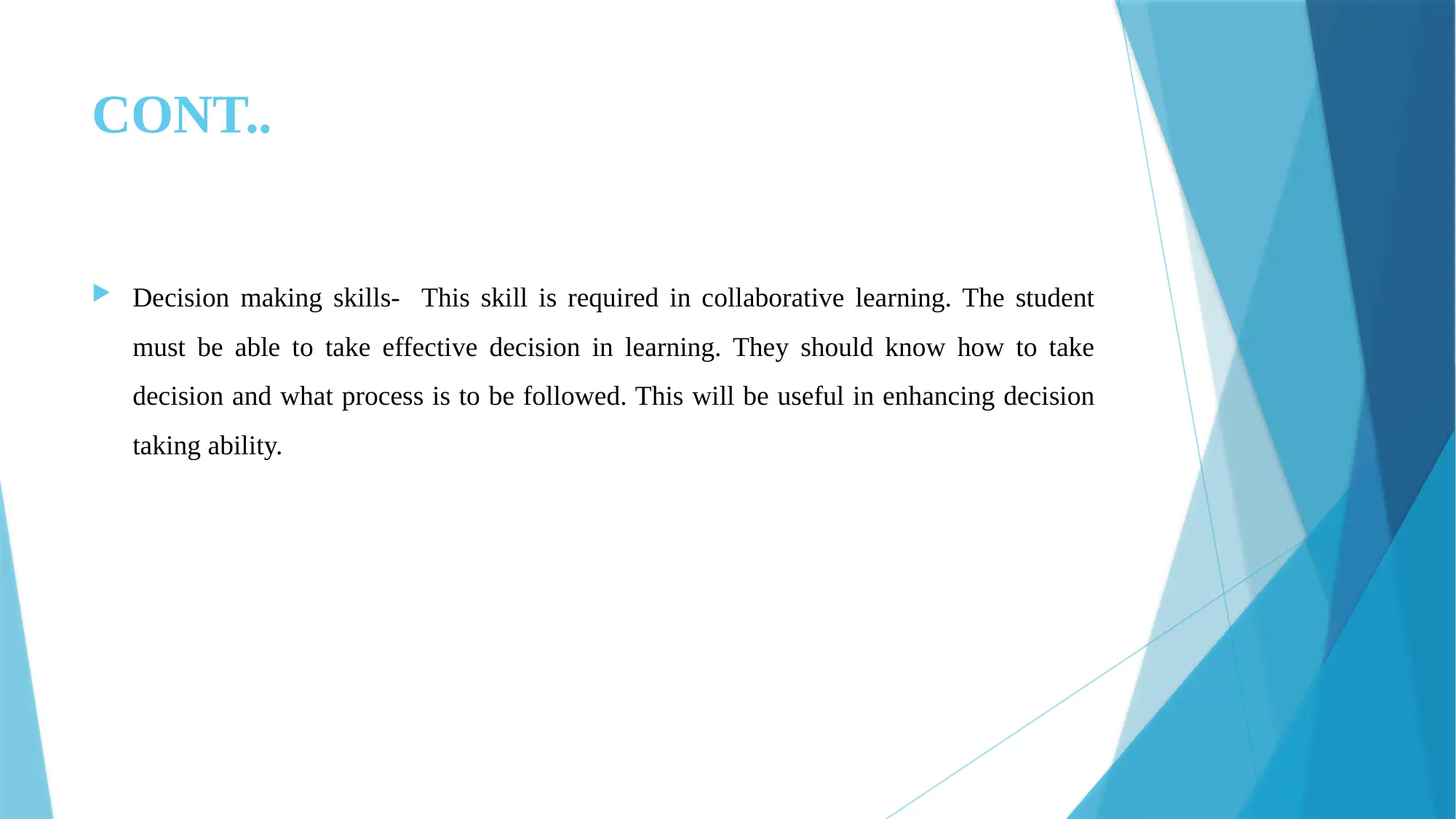
CONT..
Decision making skills- This skill is required in collaborative learning. The student
must be able to take effective decision in learning. They should know how to take
decision and what process is to be followed. This will be useful in enhancing decision
taking ability.
Decision making skills- This skill is required in collaborative learning. The student
must be able to take effective decision in learning. They should know how to take
decision and what process is to be followed. This will be useful in enhancing decision
taking ability.
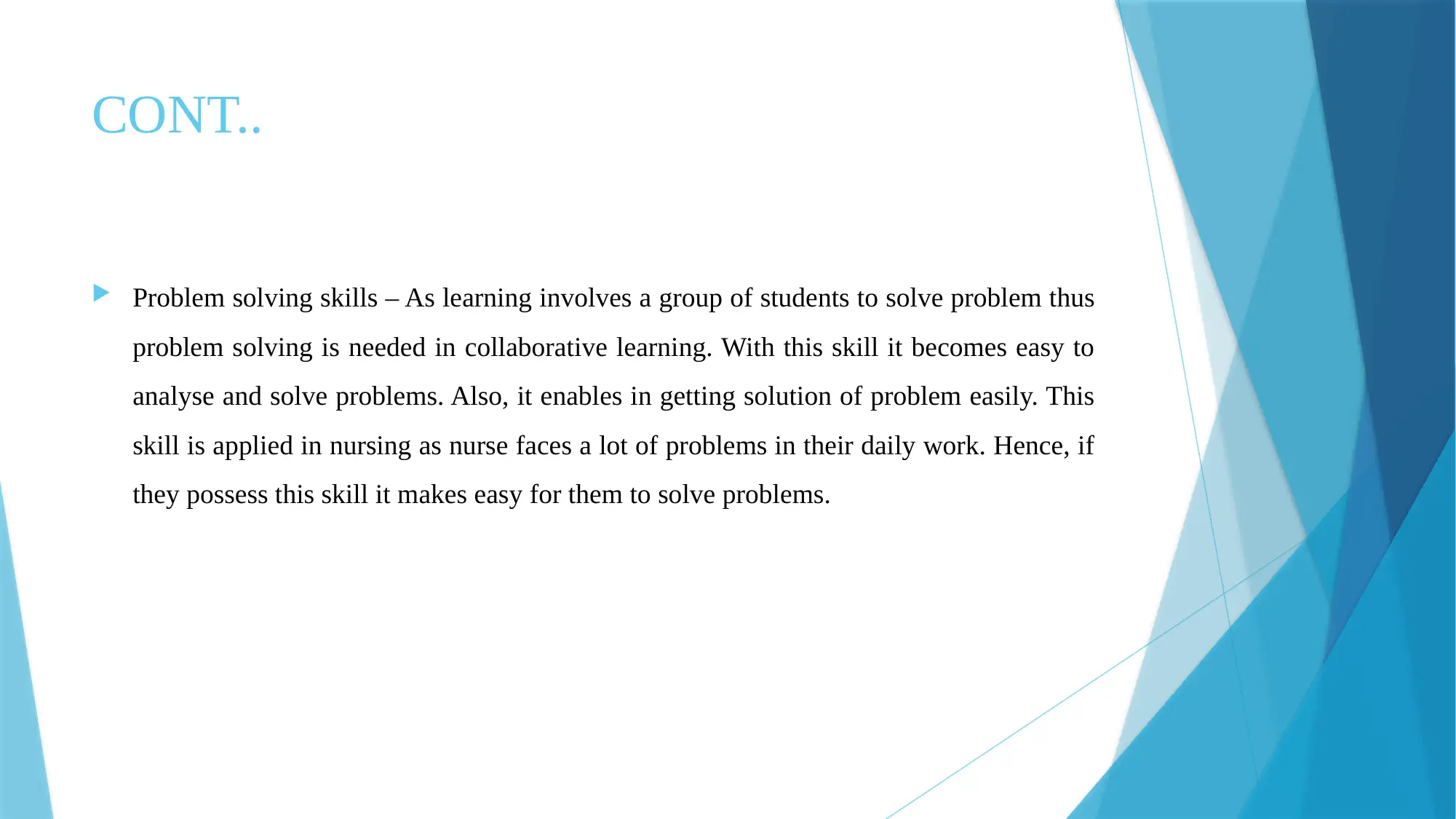
CONT..
Problem solving skills – As learning involves a group of students to solve problem thus
problem solving is needed in collaborative learning. With this skill it becomes easy to
analyse and solve problems. Also, it enables in getting solution of problem easily. This
skill is applied in nursing as nurse faces a lot of problems in their daily work. Hence, if
they possess this skill it makes easy for them to solve problems.
Problem solving skills – As learning involves a group of students to solve problem thus
problem solving is needed in collaborative learning. With this skill it becomes easy to
analyse and solve problems. Also, it enables in getting solution of problem easily. This
skill is applied in nursing as nurse faces a lot of problems in their daily work. Hence, if
they possess this skill it makes easy for them to solve problems.
⊘ This is a preview!⊘
Do you want full access?
Subscribe today to unlock all pages.

Trusted by 1+ million students worldwide
1 out of 15
Related Documents
Your All-in-One AI-Powered Toolkit for Academic Success.
+13062052269
info@desklib.com
Available 24*7 on WhatsApp / Email
![[object Object]](/_next/static/media/star-bottom.7253800d.svg)
Unlock your academic potential
Copyright © 2020–2026 A2Z Services. All Rights Reserved. Developed and managed by ZUCOL.





